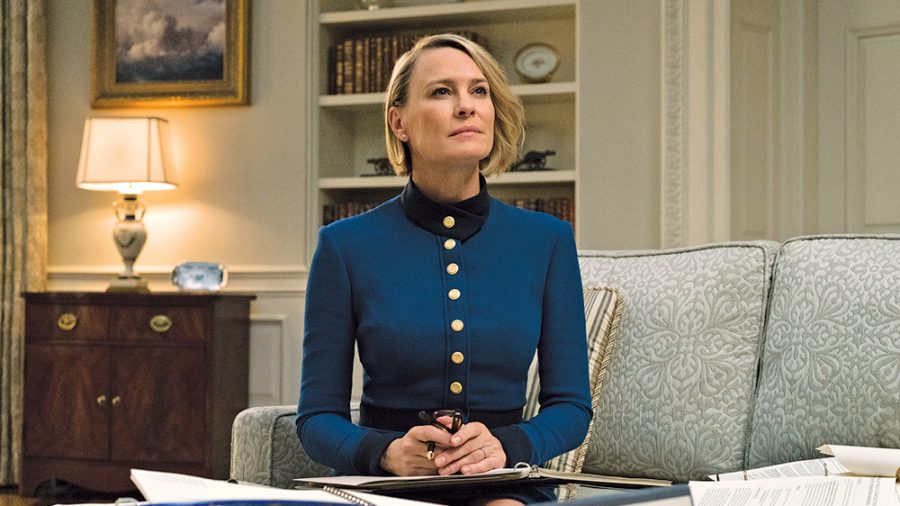Frank Underwood, the fictional congressman-turned-president played by Kevin Spacey on Netflix’s “House of Cards,” was one of television’s most twisted protagonists. From his shady political manipulations to his scathing asides to the camera, he represented a disturbing duality common in U.S. politics: a man who can nobly represent the country in the public eye, but acts villainously when the cameras are turned off. When sexual assault allegations came out against Spacey people pointed to his characters as a sort of auxiliary evidence — no wonder he’s so good at acting morally bankrupt.
Netflix ousted Spacey and produced the sixth and final season of “House of Cards,” which was released Nov. 2. The season shifts focus to Underwood’s wife, Claire Underwood (Robin Wright), and has his character killed off. Spacey’s own fall from grace eerily mirrors that of his Underwood’s own arc — a man who accumulates more and more power and is ultimately struck down by the resurgence of his past wrongdoings.
“House of Cards” is not the only example of a television show or film franchise that has had to redefine itself recently. For example, “Roseanne” has also unseated its main character and been transformed into spinoff series “The Conners.” These attempted transitions lead us to question whether it’s possible to entirely heal the blemish left on a project by the condemned actions of one of its key figures.
In recent months, bolstered by the #MeToo movement, consumers are now more morally conscious of the media they’re consuming. Woody Allen’s project “A Rainy Day in New York” was canceled by Amazon in August, even though the public continued to watch and support his films for years after the allegations of his sexual misconduct initially came out. But as a director, Allen was at the helm of his projects. Spacey, at least in “House of Cards,” was merely a player. If the bad apple is plucked from the project, can the series be restored to its former glory?
In the case of “House of Cards,” season six is still largely stuck on the legacy of the deceased Frank Underwood. According to Entertainment Weekly, “various subplots and storylines do little to add anything meaningful to what should be the story of Claire as President.” A review published by Mashable echoes a similar concern. “Gazing at the powerhouse that is Claire, it’s hard to see Spacey’s departure as anything other than a monumental gift. Or it could be, it they’d let her out from under the shadow of her husband’s specter.” Robin Wright is a powerful and formidable actor, yet her Claire Underwood is never allowed to fully exist outside of Frank’s story, even after his death.
Perhaps it is possible for a series or franchise to move past the removal of a problematic key figure. However, in this case, the most compelling aspects of “House of Cards” are strangled by the troublesome events of its recent past.
Before the allegations against Spacey came to light, “House of Cards” was one of my favorite shows on television. The moment Underwood slams his fist on the Oval Office desk after claiming the presidency is of the most impactful television scenes for me in recent memory. Upon initial viewing, it represented the exciting, the unexpected. But in today’s political and cultural climate, it has taken on a different resonance. That shocking bang is the sound of villains taking power, of unjust political processes, of men with appalling misbehaviors staying in charge and mercilessly beating everybody else down. Back then, classic anti-hero Underwood’s shadowy manipulation felt exciting and provocative. But now, the fictitious political games seem all too real.
Maybe it is best to move past by creating new television series and films that embody the lessons our culture claims to have learned from pushes like the #MeToo movement. A clean slate is what’s necessary, just as a political revolution rarely succeeds by ousting just one politician.
A version of this article appeared in the Monday, Nov. 11 print edition. Email Taylor Stout at [email protected].























































































































































